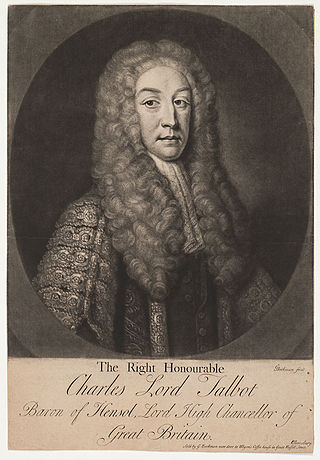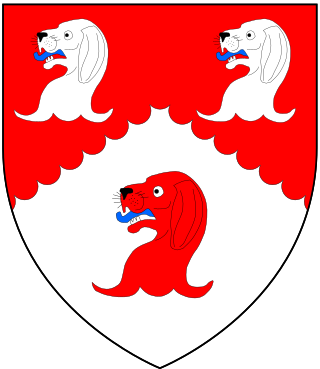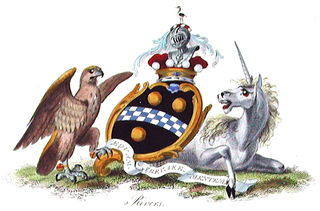Duke of Newcastle upon Tyne was a title that was created three times, once in the Peerage of England and twice in the Peerage of Great Britain. The first grant of the title was made in 1665 to William Cavendish, 1st Marquess of Newcastle upon Tyne. He was a prominent Royalist commander during the Civil War.

Marquess of Normanby is a title that has been created twice, once in the Peerage of England and once in the Peerage of the United Kingdom. The first creation came in 1694 in the Peerage of England in favour of John Sheffield, 3rd Earl of Mulgrave. He was a notable Tory politician of the late Stuart period, who served under Queen Anne as Lord Privy Seal and Lord President of the Council. In 1703 this first Marquess of Normanby was further honoured when he was made Duke of Buckingham and Normanby. These titles became extinct on the death of the 2nd Duke in 1735.
Duke of Buckingham, referring to Buckingham, is a title that has been created several times in the peerages of England, Great Britain, and the United Kingdom. There were creations of double dukedoms of Buckingham and Normanby and of Buckingham and Chandos. The last holder of the dukedom died in 1889 and the title is currently extinct.

Earl of Leicester is a title that has been created seven times. The first title was granted during the 12th century in the Peerage of England. The current title is in the Peerage of the United Kingdom and was created in 1837.

Marquess Townshend is a title in the Peerage of Great Britain held by the Townshend family of Raynham Hall in Norfolk. The title was created in 1787 for George Townshend, 4th Viscount Townshend.

Marquess of Bath is a title in the Peerage of Great Britain. It was created in 1789 for Thomas Thynne, 3rd Viscount Weymouth. The Marquess holds the subsidiary titles Baron Thynne, of Warminster in the County of Wiltshire, and Viscount Weymouth, both created in 1682 in the Peerage of England. He is also a baronet in the Baronetage of England.

Earl Talbot is a title that has been created twice in the Peerage of Great Britain. This branch of the Talbot family descends from the Hon. Sir Gilbert Talbot, third son of John Talbot, 2nd Earl of Shrewsbury. His great-great-great-grandson, the Right Reverend William Talbot, was Bishop of Oxford, of Salisbury and of Durham. His eldest son Charles Talbot was a prominent lawyer and politician. In 1733, he was raised to the Peerage of Great Britain as Lord Talbot, Baron of Hensol, in the County of Glamorgan, and then served as Lord High Chancellor of Great Britain from 1733 to 1737.

Earl Granville is a title that has been created twice, once in the Peerage of Great Britain and once in the Peerage of the United Kingdom. It is now held by members of the Leveson-Gower family.

Earl Howe is a title that has been created twice in British history, for members of the Howe and Curzon-Howe family respectively. The first creation, in the Peerage of Great Britain, was in 1788 for Richard Howe, 4th Viscount Howe, but it became extinct upon his death in 1799. The second creation, in the Peerage of the United Kingdom, was in 1821 for Richard Curzon-Howe, 2nd Viscount Curzon, and it remains extant.

Earl of Plymouth is a title that has been created three times: twice in the Peerage of England and once in the Peerage of the United Kingdom.

Viscount De L'Isle, of Penshurst in the County of Kent, is a title in the Peerage of the United Kingdom. It was created in 1956 for William Sidney, 6th Baron de L'Isle and Dudley, VC, KG, GCMG, GCVO (1909–1991).

Baron Feversham is a title that has been created twice, once in the Peerage of Great Britain and once in the Peerage of the United Kingdom. The first creation, in the Peerage of Great Britain, came in 1747 when Anthony Duncombe, who had earlier represented Salisbury and Downton in the House of Commons, was made Lord Feversham, Baron of Downton, in the County of Wilts. He had previously inherited half of the enormous fortune of his uncle Sir Charles Duncombe. However, Lord Feversham had no sons and the barony became extinct on his death in 1763. The peerage was revived in the Peerage of the United Kingdom in 1826 in favour of his kinsman Charles Duncombe, who was created Baron Feversham, of Duncombe Park in the County of York. He was a former Member of Parliament for Shaftesbury, Aldborough, Heytesbury and Newport. Duncombe was the grandson of Thomas Duncombe, son of John Brown by his wife Ursula Duncombe, aunt of the first Baron of the 1747 creation. Ursula had inherited the other half of her brother Sir Charles Duncombe's fortune. Lord Feversham son, the second Baron, sat as a Conservative Member of Parliament for Yorkshire and the North Riding of Yorkshire.

Earl of Bridgewater was a title that has been created twice in the Peerage of England, once for the Daubeny family (1538) and once for the Egerton family (1617). From 1720 to 1803, the Earls of Bridgewater also held the title of Duke of Bridgewater. The 3rd Duke of Bridgewater is famously known as the "Canal Duke", for his creation of a series of canals in North West England.

Earl Sydney, of Scadbury in the County of Kent, was a title in the Peerage of the United Kingdom. It was created in 1874 for John Townshend, 3rd Viscount Sydney.

Baron Sydney was a title that was created three times in British history. The title was later elevated twice into a viscounty, and from there, once more into an earldom.

John Robert Townshend, 1st Earl Sydney, known as The Viscount Sydney between 1831 and 1874, was a British Liberal politician. In a ministerial career spanning over 30 years, he was twice Lord Chamberlain of the Household and twice Lord Steward of the Household.
John Thomas Townshend, 2nd Viscount Sydney of St Leonards was a British peer and Member of Parliament.

Baron Carteret is a title that has been created twice in British history, once in the Peerage of England and once in the Peerage of Great Britain. The first creation came into the Peerage of England in 1681 when the fourteen-year-old Sir George Carteret, 2nd Baronet, was made Baron Carteret, of Hawnes in the County of Bedford. The peerage was originally proposed for his grandfather Sir George Carteret, 1st Baronet, a celebrated royalist statesman, but he died before he was granted the title and as his eldest son, Philip, predeceased him, it was eventually bestowed on his grandson, George, with remainder to the latter's brothers. The Baronetcy, of Metesches in the Island of Jersey, had been created for George Carteret in the Baronetage of England on 9 May 1645. Lord Carteret married Lady Grace Granville, daughter of John Granville, 1st Earl of Bath. In 1715 Lady Grace was raised to the Peerage of Great Britain in her own right as Viscountess Carteret and Countess Granville. Lord Carteret and Lady Granville were both succeeded by their son John Carteret, the second Baron and second Earl. The titles became extinct on the death of the latter's son Robert Carteret, the third Earl, in 1776.

Baron Rivers was a title that was created four times in British history, twice in the Peerage of England, once in the Peerage of Great Britain and once in the Peerage of the United Kingdom.
Sidney or Sydney is an English surname. It is probably derived from an Anglo-Saxon locational name, [æt þǣre] sīdan īege, "[at the] wide island/watermeadow" . There is also a folk etymological derivation from the French place name Saint Denis.











